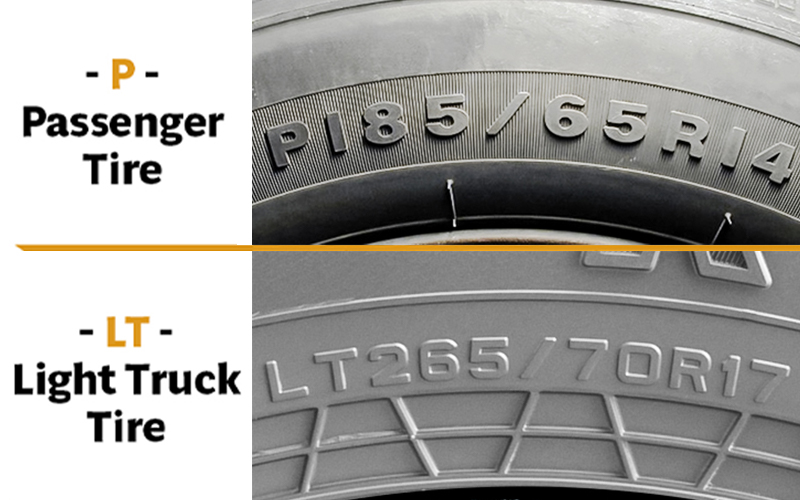When it comes to tires, a universal fit isn’t the answer. Selecting appropriate tires for your vehicle is of paramount importance in ensuring safety and optimizing overall performance. Two prevalent options are passenger tires and light truck tires. What distinguishes them? Explore the significant differences.
1. Design and Purpose
Passenger tires are meticulously engineered for sedans, hatchbacks, and smaller vehicles, taking into account the importance of a serene, noise-free ride and optimizing fuel efficiency. These tires are designed with the everyday commuter in mind, prioritizing comfort and economy.
In stark contrast, light truck tires are purposefully tailored for trucks, SUVs, and vans, exhibiting a robust construction capable of managing substantial loads and navigating through demanding terrains. These tires are the workhorses of the road, built to withstand the challenges of heavy-duty use and off-road adventures, making them the top choice for those seeking both strength and performance.
2. Load Capacity
A notable disparity lies in load capacity. Light truck tires proudly bear a higher load rating, often exceeding passenger tires by a substantial margin. This robust load-carrying capability is indispensable for trucks engaged in demanding tasks such as heavy-duty hauling or towing trailers laden with substantial cargo.
It ensures that these tires can shoulder the weight and pressure of challenging workloads while maintaining stability and safety on the road, a vital characteristic for those who rely on their vehicles for rugged, heavy-duty applications. When you need such capabilities, be sure to research and shop around for light truck tires to meet your specific needs.
3. Sidewall Construction
The construction of sidewalls in these tires differs significantly. Passenger tires typically sport softer sidewalls, engineered to absorb road imperfections and provide a cushioned, comfortable ride. On the contrary, light truck tires boast sturdier sidewalls, are designed to withstand the rigors of heavy-load transportation and excel in off-road adventures.
This enhanced sidewall strength not only enhances stability but also helps prevent punctures and damage when traversing rugged terrain or encountering obstacles, making light truck tires a reliable choice for challenging driving conditions.
4. Tread Patterns
Tread patterns exhibit variations, too. Passenger tires often showcase symmetrical or asymmetrical designs, ensuring a serene and traction-rich ride on wet roads, which is ideal for everyday commuting and highway driving. In contrast, light truck tires display more aggressive tread patterns, tailor-made for all-terrain or mud-terrain escapades, offering exceptional grip and control in challenging off-road conditions. These specialized tread patterns are designed to excel in rugged environments, providing the necessary traction to navigate through mud, gravel, and rocky terrains with confidence and stability.
5. Durability
Light truck tires are purpose-built for durability and puncture resistance. They excel in demanding conditions, such as navigating through rugged terrains, traversing gravel pathways, or enduring the rigors of construction zones. Their reinforced construction and robust materials ensure they can withstand the challenges posed by rough and uneven surfaces. In contrast, passenger tires, with their softer composition, may struggle to maintain their integrity and performance under the same demanding circumstances, potentially leading to quicker wear and tear.
6. Comfort vs. Performance
Passenger tires shine in offering a plush, tranquil journey on highways, where a smooth and quiet ride is paramount for passenger comfort during long-distance travel. In contrast, light truck tires prioritize performance and endurance, making them the preferred choice for those navigating diverse terrains and road conditions, such as rugged off-road trails, construction sites, or challenging weather conditions like snow and mud, where durability and traction are essential to ensure safe and reliable driving experiences.
7. Price
Another distinguishing factor is the price tag. Light truck tires typically come with a higher cost due to their robust construction and enhanced capabilities, which include greater load-bearing capacity and durability. This investment can prove valuable to individuals or entities seeking enhanced performance and durability.
In contrast, passenger tires often offer a more budget-friendly option, making them appealing to individuals looking for a cost-effective solution without compromising on everyday driving comfort and efficiency.
Conclusion
The decision between passenger and light truck tires hinges on your vehicle type and driving requirements. If you own a smaller car and primarily drive on paved roads, passenger tires are likely the superior choice. However, if you possess a truck or SUV and demand off-road prowess or the ability to carry substantial loads, light truck tires are the way forward. Keep in mind that your tire choice holds significant sway over your vehicle’s performance, safety, and longevity.
Sources
